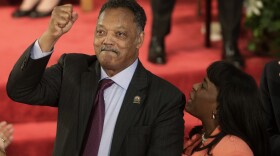The statewide teachers’ union Tuesday called on Gov. Ron DeSantis to keep school campuses closed for the rest of this academic year because of the COVID-19 pandemic.
CORONAVIRUS: Complete Coverage From WUSF And WUSF Public Media
“We know our public schools serve as refuge for many students, that our campuses provide them with meals, education and a safe haven with committed staff,” Florida Education Association President Fedrick Ingram said in a letter to DeSantis.
“As much as our students and educators want the opportunity to be back at our schools, returning prematurely will threaten the safety and well-being of all on campus.”
During a press briefing on Tuesday, DeSantis said he has not made a decision on when to reopen schools. He said he would be consulting with groups, including school superintendents and parents.
“It has to be based on safety,” DeSantis said. “We have to see where we’re going. It doesn’t mean that they are going to go back, but I think we just need to get down this road a little bit further.
“It’s not just going back to school at the end of May for a couple of weeks. What’s the fall semester going to look like for K-12? What’s it going to look like for our universities? What would need to be in place?”
State education officials last month called for all school districts to close their campuses through May 1 in an effort to halt the spread of COVID-19, the respiratory disease caused by the highly contagious novel coronavirus. Classes are being conducted online while campuses are closed.
NEWSLETTER: Sign Up For Coronavirus Updates From Health News Florida
DeSantis said Thursday he had not decided about whether to reopen campuses and raised the possibility that some students could return to classrooms sooner than others.
“We’re going to make the best decision that we can, but it may be that not every county is going to be treated the same in this,” the governor told reporters. “There is nothing wrong with that. If the problem is different in certain parts of the state, we should recognize that.”
But in the letter Tuesday, Ingram said now is “the time to declare the previously unthinkable” and keep campuses closed for the rest of the 2019-2020 academic year.
“COVID-19 presents more questions than answers,” Ingram wrote. “It also presents a threat that we cannot control. The potential damage that could be done to families and entire communities from an outbreak of COVID-19 at even one school far outweighs the inconvenience of continuing distance learning for the rest of the school year.”
Copyright 2020 WUSF Public Media - WUSF 89.7. To see more, visit . 9(MDAyMTYyMTU5MDEyOTc4NzE4ODNmYWEwYQ004))




